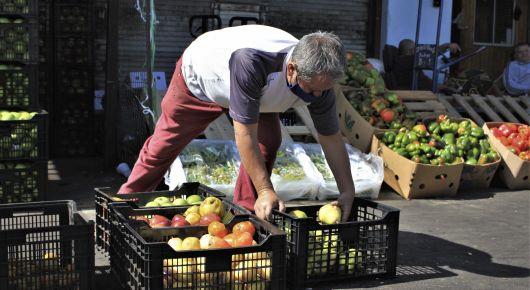New regional UN task force fosters sustainable food systems and food security

This week, the Regional United Nations System Meeting gave the green light for the kick-off of the Issue-Based Coalition (IBC) on food systems – a regional task-force to coordinate UN support on sustainable food systems in Europe and Central Asia. Sustainable food systems are a cornerstone of a sustainable future, framed by the 2030 Agenda, that should help provide healthy and nutritious diets for everyone.
Chaired by FAO and co-chaired by UNICEF, World Food Programme (WFP), and the World Health Organization (WHO), the new body will promote sustainable food systems using a multi-sectoral approach by the UN development system in support of the UN Country Teams in the region.
“The global COVID-19 pandemic made it clear-cut for us how interconnected, complex, and thus fragile our food systems are,” said Vladimir Rakhmanin, FAO Assistant Director-General and Regional Representative. “Our responsibility is to protect and strengthen them, and let sustainable food systems deliver fresh healthy and nutritious diets to everyone – for ourselves and for future generations.”
To contribute to this notion, the new issue-based coalition will advocate for improving food systems through multi-sectoral approaches involving, among others, the food, agriculture, health, and education sectors. It will foster knowledge sharing on developing and implementing appropriate policy measures by providing statistics, analytical tools, and guidelines, in addition to sharing best practices from within and outside the region.
In the light of the current human health crisis and a looming socio-economic downturn, the IBC is planning to support UN Country Teams in assessing the impact of COVID-19 on food systems in the region, facilitating policy dialogue, and sharing of good practices, as well as to help develop joint policy recommendations. Its work, however, will go beyond to coronavirus pandemic and cover support to emergency preparedness and response to food systems challenges in a wider sense – caused by any kind of disasters and emergencies.
“The information generated through the impact assessment and further surveys will enable us to source the local UN communities with consistent guidance, matching the topics and reality of the region,” Rakhmanin added.
A sustainable food system is one that delivers food security and nutrition for all in such a way that the economic, social, and environmental bases to generate food security and nutrition for future generations is not compromised. This means that it is profitable throughout, ensuring economic sustainability and broad-based benefits for society, securing social sustainability and a positive or neutral impact on the natural resource environment, and safeguarding the sustainability of the environment.
The four initiating members will reach out to other partners in the Region and UNECE and the World Meteorological Organization (WMO) have already signaled their strong interest to join and to provide support.
24 April 2020, Geneva, Switzerland
